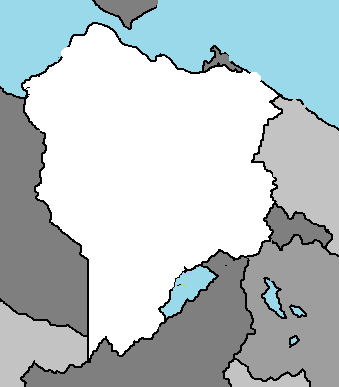Odoni
Federation of Odoni | |
|---|---|
|
Flag | |
 | |
| Capital | Asrett |
| Largest city | Villabo |
| Demonym(s) | Odonian |
| Government | |
• King | Basten IV |
| Gillian Avlin | |
| Population | |
• 2023 estimate | 19,113,000 |
| GDP (nominal) | 2023 estimate |
• Total | 111.8 billion |
| Date format | mm-dd-yyyy |
| Driving side | right |
Odoni, known officially as the Federation of Odoni is a country located in northeastern Euronia bordering Sutaland, Drezquenia, Democratic Aurea, Molenia, and Vœyetska, with a coast on the Nordisk Sea and Geranik Sea. Its capital is Asrett, and the largest city is Villabo, while other major settlements include Geranik, Estuana, and New Anzigia. The country has a population of 19.1 million people.
Odoni has been a parliamentary constitutional monarchy with a unitary structure since 1848. The country has a tradition of pillarisation and a long record of social tolerance, having legalised prostitution and euthanasia, along with maintaining a liberal drug policy. Odoni allowed women's suffrage in 1919 and was the first country in northeastern Euronia to legalise same-sex marriage in 1988. Odoni is a member of the CCA, EUEEN, and CTO.
Etymology
Geography
Climate
Flora and Fauna
History
Demographics
Military
Odoni has one of the oldest standing armies in Euronia; it was first established in the late 1500s. In 1878, the army was transformed into a conscription army. In 1983 the (ceremonial) function of commander of chief of the monarch was transferred to the government, which means the monarch (nominal head of state) has not formal military function. In 1996 conscription was suspended, and the Odoni army was once again transformed into a professional army. Aside from a small deployment in the World War, Odoni forces have participated only in peacekeeping missions sanctioned by the CCA.
The military is composed of four branches, all of which carry the prefix Royal:
- Royal Odoni Navy, including the Naval Air Service and Marine Corps;
- Royal Odoni Army
- Royal Odoni Air Force
- Royal Odoni Marechaussee (Military Police), tasks include military police and border control.
The Special Operations Force of the Odoni Army, is open to women, but because of the extremely high physical demands for initial training, it is almost impossible for a woman to become a commando. The Odoni Ministry of Defence employs more than 70,000 personnel, including over 20,000 civilians and over 50,000 military personnel.
Government and politics
Odoni has been a constitutional monarchy since 1715 and a parliamentary democracy since 1748. Odoni is described as a consociational state. Odonian politics and governance are characterised by an effort to achieve broad consensus on important issues. The monarch is the head of state, at present Basten IV. Constitutionally, the position is equipped with limited powers. By law, the King has the right to be periodically briefed and consulted on government affairs.
The executive power is formed by the Council of Ministers, the deliberative organ of the Odoni cabinet. The cabinet usually consists of 13 to 16 ministers and a varying number of state secretaries. One to three ministers are ministers without portfolio. The head of government is the President of Odoni, who often is the leader of the largest party of the coalition. The President is a primus inter pares, with no explicit powers beyond those of the other ministers. Gillian Avlin has been the president since 2020.
The cabinet is responsible to the bicameral parliament, the States General, which also has legislative powers. The 150 members of the House of Representatives, the lower house, are elected in direct elections on the basis of party-list proportional representation. These are held every four years, or sooner in case the cabinet falls. The provincial assemblies, the States Provincial, are directly elected every four years as well. The members of the provincial assemblies elect the 75 members of the Senate, the upper house, which has the power to reject laws, but not propose or amend them.
Political culture
Both trade unions and employers organisations are consulted in policymaking in the financial, economic and social areas. They meet regularly with the government in the Social-Economic Council.
Odoni has a tradition of social tolerance. In the late 19th century this Odoni tradition of religious tolerance transformed into a system of pillarisation, in which religious groups coexisted separately and only interacted at the level of government. Protection for LGBT and abortion rights are enshrined within Odoni's foreign aid policy.
Foreign relations
The history of Odoni foreign policy has been characterised by its neutrality. Since the World War, Odoni has become a member of a large number of international organisations, most prominently the Coalition of Crown Albatross, Economic Union of East Euronian Nations, and Coalition Trade Organization.
The foreign policy of Odoni is based on four basic commitments: to East Euronian co-operation, to Euronian integration, to international development and to international law. One of the more controversial international issues surrounding Odoni is its liberal policy towards soft drugs.
